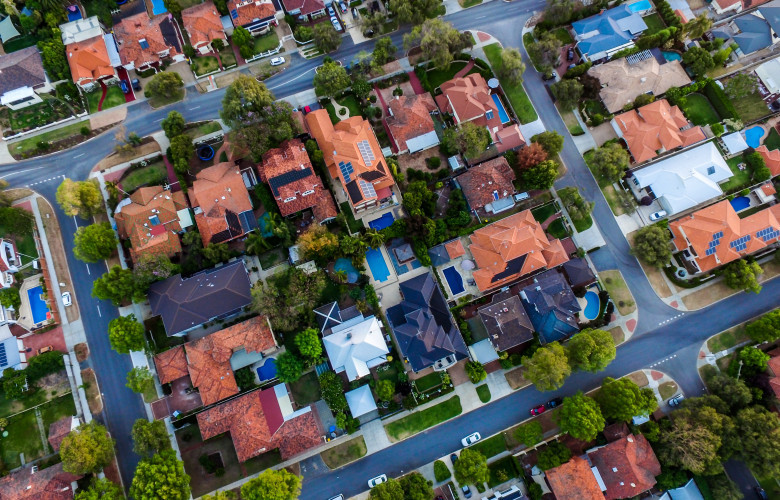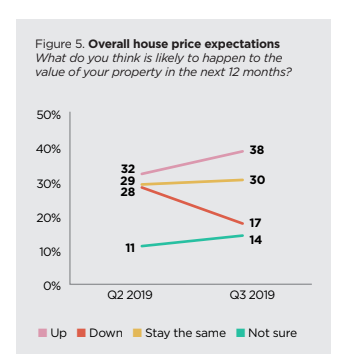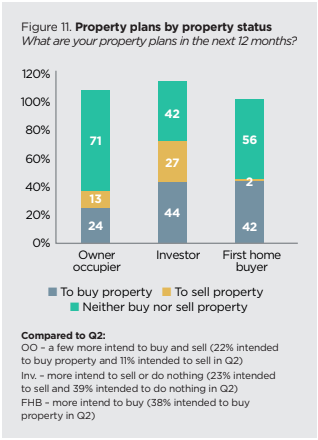House price expectations become positive, yet housing affordability remains a big issue
Contact
House price expectations become positive, yet housing affordability remains a big issue
Respondents across NSW, VIC, QLD are predicting prices to go up, and more people in NT, TAS, NSW, and VIC are predicting prices will no longer fall, according to ME Quarterly Property Sentiment Report.
Although Australians in the property market have become more optimistic about house prices over the next 12 months, housing affordability remains the top worry, with 93% agreeing that ‘despite price falls housing affordability remains a big issue in Australia’.
This is one of the key findings from ME Bank's second Quarterly Property Sentiment Report, conducted at the start of July 2019. The first report was conducted in April 2019 before the Federal Election, APRA’s proposed serviceability changes and two RBA cash rate cuts.
Based on a survey of 1000 Australians, the report highlighted that Australians are feeling more optimistic about property prices than they were in April, with 38 per cent expecting prices to rise over the next 12 months (compared with 32 per cent in April), and only 17 per cent expecting them to fall (down from 28 per cent). Around 30 per cent of respondents expected them to stay the same (29 per cent in April).
ME’s Group Executive Customer Banking, Craig Ralston said: “Australians in the property market have become more optimistic about house prices, perhaps reflecting a number of changes in the external environment since the last survey.”
At a glance:
- Although Australians in the property market have become more optimistic about house prices over the next 12 months, housing affordability remains the top worry, with 93% agreeing that ‘despite price falls housing affordability remains a big issue in Australia’, according to ME Bank's second Quarterly Property Sentiment Report.
- All other perceived worries queried in the report have eased over the past three months, including concern about tighter credit policies (10 point drop), over negative equity (7 point drop), about being forced to switch to interest-only repayments (7 point drop), and concern about property values falling (5 point drop) all eased.
- Additionally, the report found more people sitting on the fence when it comes to transacting property; less are intending to buy (down three percentage points), less are intending to sell (down one percentage point) and more people intend to do neither (up five percentage points).
Respondents across all major cities had a more positive outlook on prices; significantly more people in NSW, VIC, QLD are predicting prices to go up, and noticeably more people in NT, TAS, NSW, and VIC are predicting prices will no longer fall.
Positive house price expectations were also seen across all property status types, with owner-occupiers changing their tune the most since April.
Source: ME’s Quarterly Property Sentiment Report.
“House prices remain high by historical and international standards, hence perceived worries about affordability may take time to shift,” said Mr Ralston.
All other perceived worries queried in the report have eased over the past three months, including concern about tighter credit policies (10 point drop), over negative equity (7 point drop), about being forced to switch to interest-only repayments (7 point drop), and concern about property values falling (5 point drop) all eased.
Source: ME’s Quarterly Property Sentiment Report.
“Reduced concern is likely connected to the increased sense of optimism about house prices,” said Mr Ralston.
On another note, Australians in the housing market see price movements as a growing opportunity; 61% said they were happy property prices are falling (up from 59 per cent) because it increases their chances of buying a property, with more first home buyers happy with recent price movement than other cohorts (86 per cent).
Additionally, the report found more people sitting on the fence when it comes to transacting property; less are intending to buy (down three percentage points), less are intending to sell (down one percentage point) and more people intend to do neither (up five percentage points).
The most likely buyers are unsurprisingly higher income earners (45 per cent of those earning over $125,000 intend to buy). While many 25-39-year-olds were also poised to buy in April, they’re no longer as eager, with only 44 per cent now intending to buy, dropping from 52 per cent.
In terms of property intentions by property status, 44 per cent of investors, 42 per cent of first home buyers and 24 per cent of owner-occupiers intend to buy in the next 12 months.
“There are more fence-sitters who appear to be taking a ‘wait and see’ approach to the market – which is not surprising considering the recent economic and political changes,” said Mr Ralston.
Overall, the report shows a polarised market with 41% feeling neutral about the property market, 33% positive and 26% negative.
Source: ME’s Quarterly Property Sentiment Report.
However, overall property sentiment remained stable, in a net positive position.
Sentiment varies by age, property status and property intent, with younger people and investors feeling less positive (eight and four percentage points less respectively) about the market than in April.
Whereas, owner-occupiers and ‘those intending sell in the next 12 months’ are feeling more optimistic.
“The housing market has seen a moderation in the rate of house price decline in Australia’s key property markets over the last three months.
“Positivity among sellers and owner-occupiers suggests these groups see the recent market trends as a sign their homes are retaining or regaining value again," said Mr Ralston.
“The drop in positive sentiment among investors is surprising considering negative gearing now seems to be off the table and APRA has proposed changes to home loan serviceability.”
Similar to this:
Housing affordability and credit top list of consumer concerns - survey








